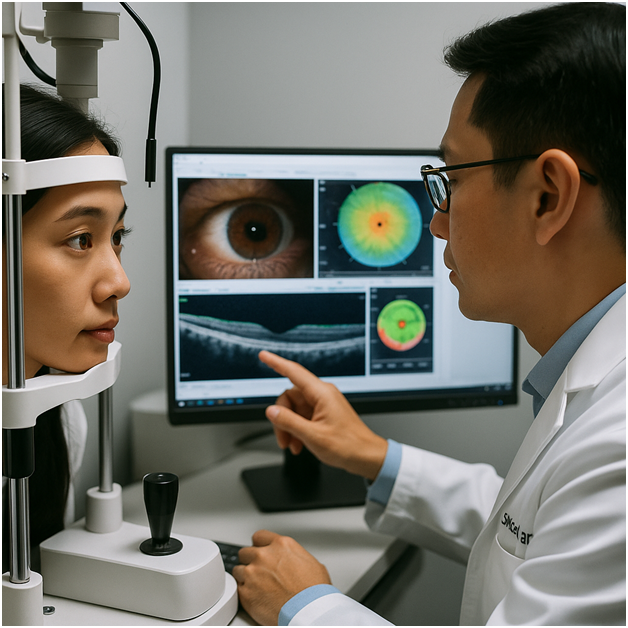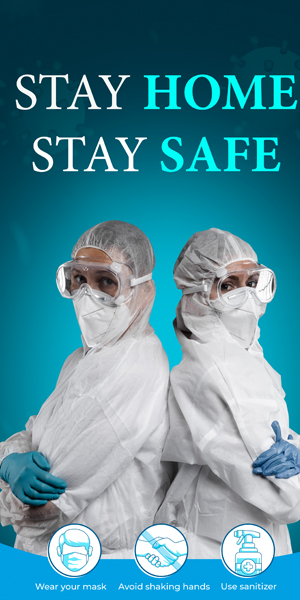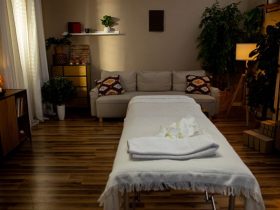If you’re over 40 and finding your glasses or contact lenses less convenient than before, it’s normal to wonder: “Is LASIK right for me?” In Singapore, countless people consider LASIK surgery every year to regain visual freedom. But how do eye doctors decide if you’re a good candidate? This guide will walk you through everything you need to know—from eligibility basics to what happens at the first consultation—so you can have informed conversations with loved ones and your eye specialist.
What Is LASIK and Why Do So Many Singaporeans Choose It?
LASIK (Laser-Assisted In Situ Keratomileusis) is a popular, minimally invasive laser procedure that reshapes the cornea to correct vision problems like myopia (short-sightedness), hyperopia (long-sightedness), and astigmatism. The main appeal? Most patients reduce or even eliminate their dependence on glasses or contacts, often with life-changing results.
For adults in Singapore, where our warm, humid weather can make glasses slip or fog up, LASIK offers lasting convenience. It’s also trusted thanks to advanced technology and strict safety standards upheld by local clinics.
Does Age Matter When Considering LASIK Surgery in Singapore?
When it comes to LASIK surgery in Singapore, age isn’t just a number—it can make a big difference. While you must be at least 18 for the procedure, most local surgeons recommend waiting until you’re 21 or older. That’s because your eye prescription should remain stable for at least one year to get the best outcome.
For adults over 40, another consideration is presbyopia—the natural aging process that makes near vision harder. Some may still benefit from LASIK, but your doctor might suggest blended vision options or other techniques. This is where a personalized evaluation becomes essential.
Stable Prescription: The Foundation of LASIK Candidacy
Before recommending LASIK, eye specialists always check that your eyesight has remained unchanged for at least 12 months. If your prescription keeps shifting—especially common in younger adults or during hormonal changes—your results may not last.
Key signs your prescription is stable:
- No significant change in spectacle power for the past year
- Minimal adjustments in your contact lens fit
- No sudden vision fluctuations
Corneal Thickness and Eye Health: Why They Matter
One test every clinic performs before approving you for LASIK is corneal thickness measurement. A healthy cornea provides enough tissue for safe reshaping. If yours is too thin, it increases risks after surgery.
Optometrists also screen for:
- Corneal diseases (e.g., keratoconus)
- Ongoing eye infections
- Uncontrolled dry eyes
- Signs of glaucoma or cataracts
Only those with clear, healthy eyes and robust corneal thickness are recommended for LASIK.
Who Are the Best Candidates for LASIK Surgery in Singapore?
The best LASIK outcomes are seen in people who meet specific criteria, including:
- Age above 21 with a stable prescription
- Myopia (up to -8.00 diopters), hyperopia (up to +4.00), and astigmatism (up to ±3.00)
- Healthy corneas — no scarring or abnormal shape
- Absence of severe dry eyes or chronic autoimmune conditions
People with extremely high prescriptions or very thin corneas may be better off exploring alternative treatments.
Medical Conditions That May Affect Your Candidacy
Sometimes, conditions outside your eyes can affect whether LASIK surgery Singapore is the safest route. Let your doctor know if you have:
- Autoimmune diseases like lupus or rheumatoid arthritis
- Uncontrolled diabetes
- Are pregnant or breastfeeding (hormonal shifts can impact vision)
- Severe, unmanaged dry eyes
These issues can slow healing or increase complication risk, so being transparent about your health history is key to optimal results.
What Happens During a Comprehensive LASIK Evaluation?
A detailed LASIK assessment at a reputable Singapore clinic involves several steps:
- Vision testing—to confirm your current eyesight and prescription stability
- Corneal topography—to map the shape and thickness of your cornea
- Pupil size measurement—to identify possible nighttime glare risks
- Tear film analysis—to screen for underlying dry eye issues
- Personal and family medical history review
Your specialist uses this data to determine not only if LASIK is suitable, but which type of laser technique is safest for you.
Alternatives to LASIK for Non-Candidates
Not everyone will be the perfect fit for LASIK surgery in Singapore, and that’s completely okay. Local clinics offer several alternatives:
- PRK (Photorefractive Keratectomy): Great for patients with thinner corneas.
- SMILE (Small Incision Lenticule Extraction): Less invasive, particularly useful if you have dry eyes.
- ICL (Implantable Collamer Lens): Works for very strong prescriptions or unusually thin corneas.
Your doctor will explain these choices during the consultation if you don’t meet LASIK criteria.
Why Choose LASIK in Singapore? What Sets Local Clinics Apart
Singapore is renowned for its state-of-the-art ophthalmic technology and some of the best LASIK surgeons in the region. Here’s why choosing a local clinic makes sense:
- Access to advanced laser platforms for customized solutions
- Highly experienced refractive surgeons
- Stringent infection control and safety protocols
- Comprehensive pre-operative screening packages
Most importantly, clinics like JL Eye Specialists build treatment plans around your personal needs—not a one-size-fits-all formula.
Tips To Prepare Before Your LASIK Consultation
Getting ready for your LASIK evaluation ensures you get the most accurate advice. Here’s how to set yourself up:
- Stop wearing soft contact lenses for 1–2 weeks before your assessment
- Write down any ongoing eye symptoms (dryness, itchiness, discomfort)
- Bring your glasses and previous prescriptions for comparison
- List questions about costs, downtime, side effects, and alternatives
Arriving prepared helps you get clear answers and confidence in your decision.
FAQs: Common Concerns About LASIK Surgery in Singapore
Is LASIK painful?
You’ll feel little to no pain as anesthetic drops are used, but some pressure is normal.
How long does recovery take?
Many people notice improved vision within 24 hours; full healing may take a few weeks.
Are the results permanent?
The majority of patients enjoy years of sharper sight, though age-related changes like presbyopia may happen later.
Choosing JL Eye Specialists: Our Approach to LASIK Care
At JL Eye Specialists, we believe in honest advice, gentle care, and tailored solutions for every patient. Our team combines decades of experience in refractive surgery with the latest diagnostic tech. Whether you’re coming for LASIK, cataract surgery, dry eye treatment, or general eye checks, you’ll receive the same patient-first service trusted by families all over Singapore.
Ready to Take the First Step Toward Clearer Vision?
Deciding if you’re a candidate for LASIK doesn’t have to be stressful. By understanding what goes into the assessment—and knowing what questions to ask—you’ll feel much more confident when meeting your eye doctor.
If you’re researching LASIK surgery Singapore or searching for the best LASIK surgeon in Singapore, let us help you navigate your options with reassurance and expertise. Book your comprehensive evaluation with JL Eye Specialists today, and take the first step toward a future with greater visual freedom.
Let’s Recap! Is LASIK Right for You?
- Age over 21 with stable eyesight
- Healthy eyes and sufficient corneal thickness
- Realistic expectations and willingness to follow post-op care
- Guidance from an experienced Singapore LASIK surgeon
LASIK is a journey, but the right support makes all the difference. For health-conscious adults and caring families throughout Singapore, the path to better vision starts with expert guidance and compassionate care.
Ready to see the world once again—clearly and confidently?
Reach out to JL Eye Specialists and start your LASIK story today.








Leave a Reply